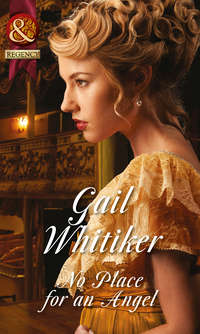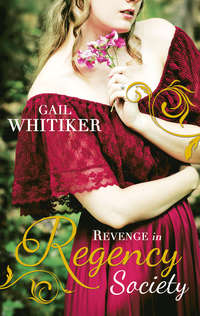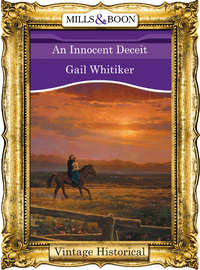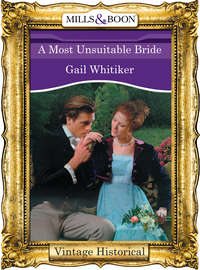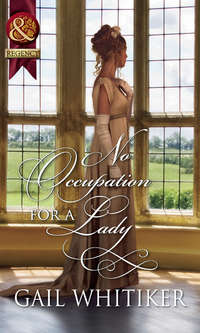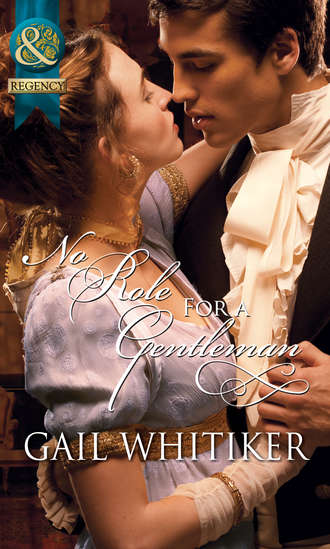
Полная версия
No Role For A Gentleman
Her aunt leaned over and peered at the title. ‘Travels through Syria and Egypt. Isn’t that more along your father’s line?’
‘It is.’
‘But Mr Bretton is a playwright.’
‘Yes, who professes an interest in ancient Egypt. He is coming to Papa’s lecture tonight.’
‘Is he indeed?’ Her aunt’s eyes twinkled. ‘Are you sure he isn’t using the book and the lecture as an excuse to further an acquaintance with you?’
‘I had no reason to think so at the time, but now I’m not so sure.’ Joanna nibbled on her bottom lip. ‘It does seem a little hard to believe after what I saw of him last night.’
‘Well, I have to believe all this attention is a problem of a most pleasurable sort,’ Mrs Gavin said, reaching for her cup and saucer. ‘I understand Captain Sterne has been paying marked attention to you of late and that Mr Osborne is in the habit of sending you posies.’
‘Yes, which I have asked him to stop,’ Joanna said. ‘I know he is related in some way to Lady Cynthia, but I cannot bring myself to like him. As for Captain Sterne, he had no time for me when I was plain Joanna Northrup, so naturally I am suspect of his affections now.’
‘But at least you have something in common with Captain Sterne,’ Mrs Gavin pointed out. ‘If memory serves, he accompanied your father on one of his early expeditions to Egypt, so his interest in the subject must be genuine.’
‘I believe it to be,’ Joanna allowed, ‘but I have always found him to be a rather arrogant man. Perhaps that is what comes of inheriting such great wealth at such a young age.’
Mrs Gavin smiled sympathetically. ‘I suspect it does change one’s circumstances. As does becoming the daughter of an earl. What about Mr Rowe? I hear you made his acquaintance last night.’
‘Yes, and I did not care for him in the least,’ Joanna said, remembering with distaste the objectionable way the man had leered at her. ‘He may be wealthy and heir to a viscountcy, but not even a king’s fortune would persuade me to marry him.’
‘Unfortunately, your aunt is using wealth as the criteria by which she determines your future husband’s suitability and, given the deplorable state of your father’s affairs, I suppose it must be a valid concern,’ Mrs Gavin said regretfully. ‘But I would not wish to see it be the only consideration when choosing the man you will marry.’
‘Neither would I, Aunt,’ Joanna acknowledged with a sigh. ‘I was far happier at the thought of marrying Mr Penscott,’ she said, referring to the young man who had worked as her father’s assistant for the past three years. ‘At least he liked me for who I was and we certainly shared an interest in Papa’s work. We could have travelled to Egypt together after we were married.’
‘I wouldn’t be so sure,’ her aunt said. ‘Mr Penscott hales from Yorkshire and northern men are very old fashioned in their notions. But it matters not since he is no longer a suitable companion for you. And I am sorry. I know you cared for him.’
‘Yes, I did. However, I suppose it is better to use one’s head than one’s heart when it comes to choosing the man with whom one will spend the rest of one’s life,’ Joanna said in a pragmatic tone. ‘The heart is notoriously unreliable.’
‘You’re thinking about Mr Patterson again, aren’t you?’
Joanna blushed, the unwelcome heat giving her away. ‘I wasn’t aware you knew about him.’
‘Of course I knew about him, child,’ her aunt said gently. ‘You were madly in love with the man, or believed yourself to be. And why would you not feel that way? He was as handsome as a young god and equally blessed when it came to the gift of oratory. I once heard him recite a poem at Lady Saxton’s summer fête and by the time he’d finished, I all but fancied myself in love with him,’ Mrs Gavin said in a wry tone. ‘But, I feared he would break your heart. He was very good at flirting with the young ladies, but not so good at following through on his promises to them.’
Joanna glanced down at her hands. ‘It all seems so silly now. But it was very painful at the time.’
‘First love always is. And you didn’t have my sister around to give you the guidance and support you so desperately needed.’
Joanna nodded, remembering how much she had longed for her mother’s advice at the time. ‘He wrote such romantic poetry. I thought … I truly believed that he had written the words just for me.’
‘No doubt he told you he had,’ her aunt said with an understanding smile. ‘But I am not sorry nothing came of it, Joanna. Mr Patterson would not have made you a good husband. Men like that never do. Most likely he’ll end up some rich woman’s cher ami, or wind up in debtor’s prison. Creativity is all very well, but sometimes the more brilliant the mind, the more unstable the person.’
Joanna smoothed her hand over her skirt, wondering why Laurence Bretton’s face suddenly came to mind. He hadn’t struck her as being in the least unstable, though there was no denying that he was two very different people—and extremely convincing in both roles.
‘So Mr Bretton is planning to attend your father’s lecture,’ her aunt said, unwittingly tapping into Joanna’s thoughts. ‘Interesting. I suspect you will see him in a very different light this evening.’
‘Of course, but in which light does he shine the truest? Writing plays must take a great deal of dedication, especially plays as successful as his,’ Joanna said, getting to her feet. ‘How can he divide his time between that and the study of ancient Egypt?’
‘Obviously, he makes time for both. It is not a bad thing to have such diverse interests.’
Joanna managed a grudging smile. ‘You like him.’
‘Yes, I do. I sense he is a good man and I like his manners and humility very much,’ her aunt said. ‘You were not kind to him today yet he did not speak harshly to you.’
Joanna flushed at the criticism. ‘He was not honest with me when we first met. He should have told me who he was and what he did, rather than leave me to find out at Mrs Blough-Upton’s reception.’
‘I suspect he had his reasons for keeping silent. Nor am I saying that you should think of Mr Bretton as someone you might wish to marry because quite clearly he is not. He is far from being your social equal and that is something you must now constantly bear in mind.’
It was a truism Joanna had not yet come to terms with, even though it was one of the principles that guided society. ‘I fail to see why. Dukes marry actresses and are not thought any the less of for it.’
‘Unfortunately, dukes can do whatever they wish,’ Mrs Gavin said, chuckling. ‘With rank comes privilege and I know a number of ladies and gentlemen who have made excellent use of both. But I am confident you will make the right choice when the time comes,’ she said, getting to her feet. ‘Just remember that a promise once given is difficult to retract and a vow once spoken is spoken for life.’
Joanna glanced at the book Mr Bretton had left for her, beginning to wish she had never encouraged the conversation with him in the bookshop. He confused her … and Joanna didn’t like being confused. Indeed, life in general seemed to have become a great deal more complicated since her father had become Lord Bonnington. ‘Thank you, Aunt Florence,’ Joanna said, slipping an arm around her aunt’s waist. ‘You know how much I value your opinion.’
‘Poppycock. You likely think my notions as old fashioned as I am, but are too kind to say so. Well, never mind. All I want is to see you happy. Money is not the only reason to wed, just as having your heart broken once is no reason to shy away from love. But I’m sure you already know that.’
Joanna nodded and kissed her aunt’s cheek before bidding her a fond farewell. Only then did she turn her attention to the book Mr Bretton had left for her. She was glad the brusqueness of her words at Mrs Blough-Upton’s reception had not affected his decision to lend it to her, but she was sorry his arrival today had coincided with her aunt’s—who seemed as enamoured of the man as everyone else.
Was she the only one who thought his not telling her the truth was a problem?
Joanna picked up the book and held it reverently in her hands. It was a lovely copy: leather bound, beautifully engraved and in excellent condition. Mr Bretton certainly took good care of his books, but then, who would have more respect for the written word than a man who made his living by them? A playwright would be as respectful of books as her father and Mr Penscott were of the ancient scrolls they found buried in the tombs.
But could the dashing Laurence Bretton, more famously known as Valentine Lawe, really be as interested in those artefacts as he was in his wildly successful plays? Did his reasons for wanting to attend the lecture tonight stem from a genuine desire to learn more about the distant past? Or were they, as Joanna was beginning to fear, little more than an excuse for spending time with her, as her aunt was all too inclined to think?
The Apollo Club was a favoured haunt of gentlemen who gathered to share ideas and exchange views on a variety of interesting and diverse topics. It was also where Ben Jonson had written The Devil is an Asse, thereby serving to unite Laurence’s literary leanings with his more historical ones. No doubt that was why he felt so at home as he strolled into the room known as the Oracle of Apollo a full fifteen minutes before the clock struck seven.
For once, he was in his element, surrounded by fellow students of history all caught up in the excitement of hearing about William Northrup’s—correction, Lord Bonnington’s—latest expedition to Egypt and of the wondrous things he had seen there. Valentine Lawe didn’t belong here any more than an orchid belonged in the desert and Laurence was heartily relieved when no one seemed to recognise him. No doubt the conservative clothes and spectacles helped.
He glanced towards the front of the room where Lady Joanna and her father were busy getting ready for the lecture and allowed himself the pleasure of watching her unobserved for a few minutes. She was dressed in a dark-blue pelisse over a pale-blue gown, the fitted lines of the garment making her look even more slender than she had in the bookshop. She had set her bonnet aside, allowing the candlelight to catch the highlights in her hair, and her cheeks were slightly flushed as a result of her efforts at getting everything ready.
‘Joanna, where are my samples of pottery from the fourth week’s dig?’ her father asked abruptly. ‘Don’t tell me I forgot to bring them!’
‘You did, Papa, but I did not,’ Lady Joanna said, calmly lifting a wooden box on to the table. ‘All ten pieces are here, labelled as to their place of origin and date of discovery.’
‘And the papyrus scrolls?’
‘In the glass cases. I wasn’t willing to risk curious onlookers being overly enthusiastic in their handling of them.’
‘Excellent,’ Lord Bonnington said, regarding the neat arrangement of glass display cases with approval. ‘Now, if we can just get these last few pieces of statuary in place—ah, there you are, Mr Penscott,’ he said as a lanky young man wearing a dark-brown jacket over fawn-coloured breeches walked up to the table. ‘Give me a hand with this stone head, will you?’
‘Of course, my lord,’ Penscott said, bending to pick it up. His sandy-coloured hair was swept back from a wide forehead bronzed by the sun and he had a pleasant, amiable countenance. ‘It’s my job to do the heavy lifting. Isn’t that right, Lady Joanna?’
The tone was affectionate and the remark, judging from the colour that blossomed in Lady Joanna’s cheeks, was not entirely unwelcome, making Laurence wonder as to the nature of the relationship. ‘It is indeed, Mr Penscott.’ She looked up from her notes and smiled. ‘That, and making tea over a campfire, which you do exceptionally well.’ Then she saw Laurence and the smile froze on her lips. ‘Mr Bretton. You’re … early.’
‘Am I?’ Laurence pulled out his pocket watch and flicked open the lid. ‘A few minutes, perhaps, but you did tell me I should come early if I wished to secure a good seat. A sound piece of advice given how crowded the room is already.’
She appeared flustered, as though she hadn’t really expected him to come. ‘Yes, well, as I said, this is the … first opportunity my father has had to speak about his trip to Dendera since we emerged from mourning. It is only to be expected that there would be … a great deal of curiosity about what he found.’
Laurence closed the watch and slipped it back into his pocket, finding her distress curious. Was she embarrassed that he had witnessed her light-hearted exchange with the other man?
Mr Penscott didn’t seem to care. After a cursory glance in Laurence’s direction, he went back to unpacking boxes and even her father didn’t raise his head. Clearly, the reasons for the lady’s discomfort were her own. Deciding not to make an issue of it, Laurence said, ‘I would not have expected otherwise. Your father’s reputation is well known in London.’ He set his satchel on one of the vacant seats. ‘For that reason, I hope there will be an opportunity to speak to him after the lecture concludes.’
‘That will depend on how many questions he is asked,’ Lady Joanna said. ‘Upon occasion, he has been known to run very late.’
‘Except when you are on hand to keep him to his schedule,’ Laurence said, gently reminding her of the comment she had made upon the occasion of their first meeting. ‘I’m sure he is grateful for your help in that regard, as well as in the organising of matters beforehand.’
‘It is … a necessary part of planning the evening,’ Lady Joanna agreed. She glanced back down at her notes, her brow furrowing. ‘Now if you will excuse me, I must get back to work. There is still much to be done before the lecture gets underway.’
Laurence inclined his head. ‘Of course. I would hate to be the cause of any delay.’
Joanna glanced at him briefly, then turned and walked away. She wasn’t sure why she felt so flustered all of a sudden. She had done enough of these presentations that standing in front of a room full of men didn’t bother her any more. What, then? Embarrassment that he witnessed her comfortable exchange with Mr Penscott?
Surely not. There was nothing wrong with colleagues enjoying a laugh together. Certainly no one else seemed to think so. After a brief glance at the newcomer, Mr Penscott had gone back to unpacking boxes and her father seemed not to have heard the exchange at all. Even Mr Bretton did not seem unduly concerned. Following his last comment, he had sat down and taken a small leather-bound notebook from his satchel, which he had proceeded to open and lay flat upon his lap. Joanna had seen lines of writing, along with what looked like hieroglyphic symbols covering the page from top to bottom. A moment later, he’d taken out a pencil and began making notes and hadn’t looked at her again.
Unreasonably miffed, Joanna had carried on with her preparations. So, the great Valentine Lawe had deigned to make an appearance. How gracious of him. He had even dressed for the part, looking every inch the academic in a dark jacket over breeches and boots, his appearance smart but decidedly understated. He had abandoned his fancy lace jabot for a conservatively striped neckcloth and the signature rose was nowhere in sight. He was even wearing his wire-rimmed spectacles again.
Did he really need them, Joanna wondered, or were they little more than a contrivance?
Not that it mattered, she reminded herself. Laurence Bretton was only one of the many gentlemen who had come to hear her father speak and though she had given him an invitation, it did not entitle him to any special consideration. She had extended the invitation for the same reason he had offered to lend her the book—because they shared a common interest in Egypt.
That was all. Joanna had no intention of getting to know the gentleman better because despite Lady Cynthia’s beliefs that Mr Bretton was interested in her, Joanna knew all too well the fickleness of the writer’s heart. She had experienced it firsthand. Her infatuation with Aldwyn Patterson had scarred her to a far greater degree than anyone knew because only Joanna knew what he had whispered to her in the folly when they were alone. Only she knew the sweet promises he had made and the lyrical poetry he had written extolling her glorious emerald eyes and the sweetness of her face.
Only she knew how madly and stupidly she had fallen in love—only to discover his true nature when she had found out she was not the only young lady to be on the receiving end of his flattery.
Such was her disappointment in having discovered Laurence Bretton’s true calling. Though he was a different kind of writer, Joanna had no reason to suspect he was any different at heart. He lived in a world of fictional characters and implausible scenarios.
Witness his appearance as Valentine Lawe. What was that if not just another role in his world of make believe?
But her world wasn’t like that any more. Joanna was no longer in control of her own destiny. She was the daughter of an impoverished earl, fated to marry a man of means; one who possessed either wealth or a title, or better yet, wealth and a title, and who was willing to spend a large part of that wealth on the restoration of Joanna’s home.
That was the only hope her family had. Personal feelings didn’t enter into it. She was to be married off to the highest bidder—and she was deceiving herself if she thought to call it anything else.
For Laurence, the next two hours flew by. Lord Bonnington offered a highly informative talk concerning his explorations of the ruins at Dendera and of the many unexpected finds he and his team had made along the way. Numerous samples were documented and described, some that were passed around during the course of the discussion, while the more delicate articles were kept at the front of the room for viewing. Mr Penscott, who turned out to be a former student of Bonnington’s as well as his assistant, was often called upon to elaborate a point, though his explanations, being more straightforward than the earl’s, were better suited to the laymen in the audience.
Then there were the engravings, incredibly lifelike drawings of hieroglyphs and friezes, drawn in greatly reduced scale, but in such exquisite detail that Laurence could almost picture himself sitting on the artist’s stool, gazing at the magnificent scenes before him. And she had drawn them. Lady Joanna Northrup. To his surprise, the lovely and refined young woman who was destined to become mistress of a grand house in London was also one of the finest illustrators he had ever seen.
His admiration and respect for her only grew.
Unfortunately, as the evening went on so did his awareness of the differences between them. She was the daughter of an earl; a woman who lived in a world vastly removed from his and whose privileged life included servants, magnificent houses and all the conveniences money could buy.
He was the son of a gentleman and a minister’s daughter. Though better educated than most and with opportunities greater than some, Laurence knew he would never achieve the lofty heights necessary to be considered someone with whom Lady Joanna might associate.
She was a goddess and he a mere mortal bound to earth. Not surprisingly, the discovery left him with a decidedly hollow feeling.
‘Smashing good lecture, eh what?’ said the gentleman seated next to him. ‘I’d have given my eye-teeth to be on that expedition. But, I’m the first to admit my travelling days are over.’
Laurence regarded the gentleman, who didn’t appear to be much over fifty, with amusement. ‘You look as though you still have a good few trips left in you.’
‘Appreciate you saying so, m’boy, but traipsing through the desert is work for younger men than me.’ He turned his head and levelled a surprisingly keen look at Laurence. ‘Ever been to Egypt, Mr …?’
‘Bretton. And, no, I haven’t. Everything I know about the subject has been learned from books and from following the exploits of men like Lord Bonnington.’
‘Pity. Reading about the pyramids is nothing like standing at the top of one of those magnificent structures, knowing as you gaze out over the desert that it holds a thousand secrets you’re never going to be able to uncover. You can’t get any of that from a book.’
Laurence smiled, recognising in the man beside him the spirit of a true adventurer. ‘You’ve been there.’
‘Oh, yes,’ his companion said, ‘and I was younger than you when I made my first trip. Not many young bucks were making the journey back then. Most of them went to Florence and Rome on their grand tours. But Egypt is becoming popular now and I hear there are even ladies making the trip, though I don’t hold with all that nonsense. The desert’s no place for a woman.’
‘I heard that, Mr Dustin,’ Lady Joanna said in a tone of mild amusement as she came up behind them. ‘And I take leave to disagree with you.’
‘Of course you do, my dear, because you are your father’s daughter and every bit as stubborn, though I won’t hold that against you,’ he said, winking. ‘However, if you’ll excuse me, I want a word with Bonnington before he leaves. I’ve a slight difference of opinion when it comes to his theory about Seti the First, though he’ll likely tell me I’m talking through my hat.’ Abruptly, Mr Dustin turned and extended his hand to Laurence. ‘Don’t forget what I said, young man. If you ever get the chance to go, take it! You won’t regret it.’
‘I’ll be sure to remember your advice,’ Laurence said, shaking Mr Dustin’s hand. It was only as he did that he noticed the ebony-topped cane gripped in the gentleman’s other hand and realised why Mr Dustin’s travelling days were over.
‘Well, Mr Bretton, did you enjoy the lecture?’ Lady Joanna enquired when they were alone.
Her tone was no warmer than it had been earlier, but aware that she had, at least, come to speak to him, Laurence decided to make the most of it. ‘Very much. I am more envious than ever of what you saw and experienced while you were there.’
Her brow furrowed, but in confusion rather than disagreement. ‘Why would you say that? You are a famous playwright. A man much admired in society. What reason can you have for being envious of anyone?’
‘I am envious because I haven’t seen everything I want to see, or travelled to all the places I wish to travel,’ Laurence said. ‘Just because I write plays doesn’t mean I can’t have other interests.’
‘But the study of ancient Egypt must be one’s passion,’ Lady Joanna said. ‘A person could spend a lifetime engaged in such work and never know all there is to know. I’m sure the same could be said about writing plays.’
‘Yet, did Shakespeare not write a play about Caesar and Cleopatra?’ Laurence countered. ‘One that would have necessitated his having a thorough understanding of the history of the time in order to be able to write about two of its most colourful characters?’
‘Of course, but Shakespeare was first and foremost a playwright. Any research he did would have been undertaken to validate the dialogue and the lifestyles of the characters about which he wrote. You claim an interest in a field that is as strongly felt as what you must feel for writing.’
Laurence couldn’t argue with that because he couldn’t tell her that his first love really was history and that he wasn’t a famous playwright at all, that the mask he wore as Valentine Lawe was precisely that. But neither could he deny that her persistent doubts were beginning to bother him. ‘Lady Joanna. You do not know me well. Indeed, you do not know me at all, but I trust you will believe me when I say that I am capable of having interests in areas beyond those for which I have gained renown. Yes, I am a student of the classics and have read and enjoyed the works of Socrates and Shakespeare,’ he said quietly. ‘However, I also enjoy music, art, sport and history. Egyptian history, in particular. I have followed the exploits of Mr Burckhardt and Monsieur Champollion, having been fascinated by the latter’s précis du système hiéroglyphique, and I am here tonight because I admire your father’s work and want to learn more.’


